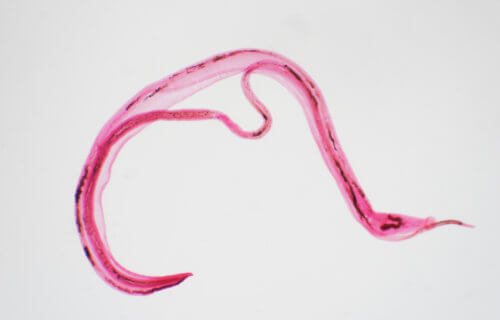LONDON — There are few thoughts as unsettling as the notion of having an intestinal stowaway living within one’s very body. Parasitic worm infections are usually the stuff of nightmares, but a new study finds a type of parasite may actually be the “key” to living longer and avoiding chronic disease.
Researchers from University College London say that for most of human history, helminth parasites have been harmlessly infecting and living inside humans much more regularly than modern day rates of infection in the West. It’s only been in more decades, since the advent of greater hygiene and sanitation methods that infection rates have plummeted.
So, due to literally thousands of years’ worth of “collaboration,” study authors report that these parasitic worms could actually be considered humanity’s “old friends.” They say losing the presence of these worms in the body can cause aging-associated inflammation.
With this in mind, they theorize that carefully controlled, restorative hookworm “treatments” may help slow down aging. The method could even protect against various ailments like dementia or heart disease.
“A decline in exposure to commensal microbes and gut helminths in developed countries has been linked to increased prevalence of allergic and autoimmune inflammatory disorders – the so-called ‘old friends hypothesis’,” explains study author Bruce Zhang, Undergraduate Assistant at the UCL Institute of Healthy Aging, in a release. “A further possibility is that this loss of ‘old friend’ microbes and helminths increases the sterile, aging-associated inflammation known as inflammageing.”
‘Master manipulators’ of the immune system
Inflammageing, or age-related inflammation, is continually named as a major factor in the development of many serious health conditions typically experienced later in life. Examples include cancer, dementia, eye disease, and even more serious COVID-19 symptoms. So, if parasitic worms really cut down on inflammation, that’s a significant health boost.
Upon infection, parasitic worms set up shop in the intestines and gut. This is important because the gut microbiome is thought to play a big role in inflammation levels.
According to study authors, parasitic worms are “master manipulators” when it comes to the human immune system. And, in turn, humans have developed a certain level of “tolerance” to these parasites.
Researchers linked the loss of parasitic worms to various inflammatory diseases like asthma, multiple sclerosis, rheumatoid arthritis, diabetes, atopic eczema, and inflammatory bowel disease. Similarly, some earlier studies have found evidence that parasitic worm infections can help fight some diseases such as multiple sclerosis and eczema.
You don’t have to be infected with a parasitic worm for benefits
Of course, few people will be willing to be infected with a full blown hookworm. Luckily, study authors say there is another way to reap the benefits of these creatures without enduring a full-blown infection. Helminth-derived proteins have already been tested on mice and shown promising results, benefitting the rodents’ guts and fat tissues.
So, if hookworms help cut down inflammation-related aging, shouldn’t areas with greater rates of infection show this trend? Sure enough, researchers say there is some evidence showing that very relationship. In a region of Eastern India that saw an outbreak of parasitic infections, all locals with rheumatoid arthritis showed no signs of a worm infection. But, 40 percent of locals without RA were indeed infected with a worm. While not exactly conclusive, these results suggest the worms protected the infected from RA-related inflammation.
“It goes without saying that improvements in hygiene and elimination of helminth parasites have been of incalculable benefit to humanity, but a cost coupled to this benefit is abnormalities of immune function,” concludes study co-author David Gems, Professor of Biogerontology and Research Director at the UCL Institute of Healthy Aging. “In the wake of successes during the last century in eliminating the evil of helminths, the time now seems right to further explore their possible benefits, particularly for our aging population – strange as this may sound.”
The study is published in eLife.
